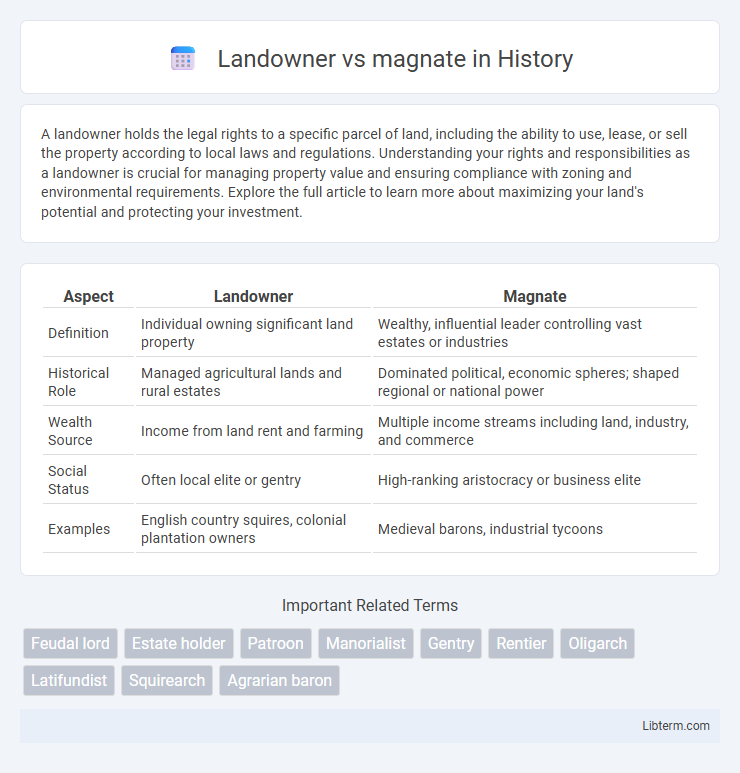A landowner holds the legal rights to a specific parcel of land, including the ability to use, lease, or sell the property according to local laws and regulations. Understanding your rights and responsibilities as a landowner is crucial for managing property value and ensuring compliance with zoning and environmental requirements. Explore the full article to learn more about maximizing your land's potential and protecting your investment.
Table of Comparison
| Aspect | Landowner | Magnate |
|---|---|---|
| Definition | Individual owning significant land property | Wealthy, influential leader controlling vast estates or industries |
| Historical Role | Managed agricultural lands and rural estates | Dominated political, economic spheres; shaped regional or national power |
| Wealth Source | Income from land rent and farming | Multiple income streams including land, industry, and commerce |
| Social Status | Often local elite or gentry | High-ranking aristocracy or business elite |
| Examples | English country squires, colonial plantation owners | Medieval barons, industrial tycoons |
Defining Landowner vs Magnate
A landowner is an individual or entity that holds legal ownership over a specific parcel of land, often managing or cultivating it for personal use or income generation. In contrast, a magnate refers to a person of great influence and wealth, typically possessing extensive landholdings or assets across various industries. The key distinction lies in the scale and scope: landowners maintain property rights, while magnates wield significant economic and social power beyond mere landownership.
Historical Context: Landownership and Wealth
Landowners historically held wealth through large agricultural estates, often controlling rural economies and local governance during feudal and post-feudal eras. Magnates, by contrast, amassed wealth primarily through diversified ventures such as commerce, industry, or political influence, especially prominent in the early modern and industrial periods. The transition from agrarian landownership to capitalist magnate dominance reflects broad socioeconomic shifts from feudal land-based power to modern economic systems.
Economic Influence and Power Dynamics
Landowners typically derive economic influence from control over agricultural resources and rural estates, leveraging land to generate steady income and local authority. Magnates command broader economic power through diversified holdings in industries, finance, and real estate, enabling significant influence over markets and political landscapes. The power dynamics favor magnates who wield expansive networks and capital, though landowners maintain regional influence rooted in land-based wealth and social status.
Legal Rights and Responsibilities
A landowner holds legal rights primarily related to property ownership, including the right to sell, lease, or develop the land, while being responsible for property taxes, maintenance, and adherence to zoning laws. A magnate, often a wealthy individual with extensive business interests, may own multiple properties but has broader legal responsibilities encompassing corporate governance, regulatory compliance, and fiduciary duties beyond land ownership. Both roles require navigating complex legal frameworks, but magnates face additional accountability in managing diverse assets and business operations under commercial law.
Social Status and Public Perception
Landowners typically hold social status rooted in hereditary land possession and local influence, often seen as traditional custodians of rural communities. Magnates, by contrast, derive their status from vast wealth and control over industries or commerce, attracting public perception as powerful, sometimes controversial, figures. Socially, landowners are respected for stability and legacy, while magnates are admired or critiqued for economic impact and modern prominence.
Wealth Accumulation Strategies
Landowners accumulate wealth primarily through rental income, agricultural production, and land appreciation, leveraging real estate assets as a steady long-term investment. Magnates diversify wealth accumulation by engaging in multiple high-revenue industries such as finance, technology, and manufacturing, often reinvesting profits into scalable business ventures. Both utilize strategic asset management, yet magnates typically focus on rapid growth and market influence, while landowners emphasize estate value preservation and incremental income.
Role in Local and Global Economies
Landowners wield significant influence in local economies through property management, agricultural production, and real estate development, often shaping regional markets and community wealth distribution. Magnates, by contrast, operate on a global scale, controlling vast corporate empires across industries such as technology, finance, and manufacturing, driving international trade and investment flows. The economic impact of landowners tends to be localized and tied to tangible assets, whereas magnates leverage diversified portfolios and capital markets to influence global economic trends.
Modern Examples: Case Studies
Modern examples of landowners include figures like John Malone, who holds nearly 2.2 million acres of private land in the United States, demonstrating significant agricultural and conservation influence. In contrast, business magnates such as Elon Musk leverage diverse portfolios beyond land ownership, impacting technology and energy sectors globally. Case studies highlight Malone's strategic land investments shaping rural economies, while Musk's ventures drive innovation and market disruptions in multiple industries.
Challenges and Controversies
Landowners often face challenges related to zoning laws, property taxes, and tenant disputes that can affect their ability to manage and profit from their land efficiently. In contrast, magnates encounter controversies stemming from their vast influence in multiple industries, including allegations of monopolistic practices, political lobbying, and ethical concerns over wealth disparity. Both roles involve navigating complex legal frameworks and public scrutiny, but magnates typically bear greater responsibility for socioeconomic impacts on communities and markets.
Future Trends and Emerging Differences
Landowners increasingly integrate technology-driven land management tools to optimize resource use and sustainability, while magnates focus on diversifying portfolios through investments in emerging sectors like renewable energy and real estate tech. The rise of digital platforms and data analytics fosters more strategic decision-making for landowners, contrasting with magnates who leverage global networks to influence market trends and capital flows. Future trends highlight a growing divergence in approaches, with landowners prioritizing ecological value and local impact, whereas magnates emphasize scalability and financial innovation.
Landowner Infographic

 libterm.com
libterm.com